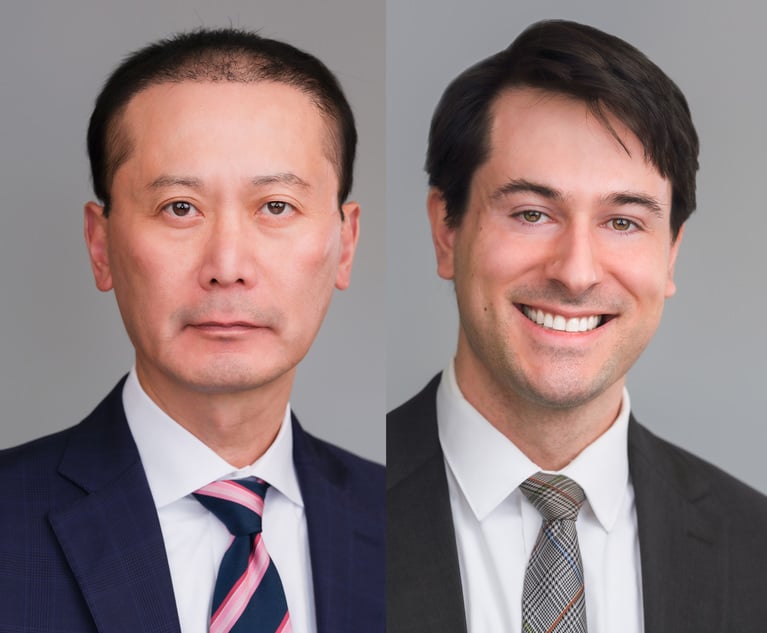Edward T. Kang

December 20, 2024 | The Legal Intelligencer
Stacked Decks and Sealed Deals: How Arbitration Tilts the ScalesWhile vigorous efforts have been made to push the courts to interpret the Federal Arbitration Act (FAA) with an increasingly broad preemptive scope, effectively overriding state laws designed to regulate arbitration, recent decisions underscore that courts are not willing to uphold arbitration agreements when fairness and justice might be compromised. Legitimate concerns surrounding arbitration are prompting more judicial scrutiny—a trend worth examining.
By Edward T. Kang
8 minute read

November 27, 2024 | The Legal Intelligencer
Don’t Settle for the Minimum: Finding Constitutional Claims Closer to HomeThe U.S. Constitution, which remains the bedrock of American civil rights, serves to establish a minimum level of protection that states are bound to uphold. Some state constitutions provide more expansive and detailed protections for state residents—meaning that rather than treating state constitutional claims as an afterthought, litigants can center their claims on state constitutions when those state constitutions offer more favorable grounds to secure their rights.
By Edward T. Kang
7 minute read

November 07, 2024 | The Legal Intelligencer
Civil RICO's Expanding Reach: From Foreign Schemes to Lost EmploymentSome recent cases, such as Yegiazaryan v. Smagin and Medical Marijuana v. Horn, show that the courts are grappling with the statute's injury requirement and might expand the sense of hope for plaintiffs.
By Edward T. Kang
7 minute read

October 17, 2024 | The Legal Intelligencer
A Word on Hearsay: Using Prior Statements Under Pennsylvania and Federal RulesAlthough hearsay evidence is generally prohibited, the definitional carve-outs and exceptions provide trial judges with the latitude to admit trustworthy evidence that would otherwise be excluded. Both the Pennsylvania Code and the Federal Rules of Evidence recognize such exceptions, but they approach their admissibility and use with distinct priorities and limitations.
By Edward T. Kang
7 minute read

August 30, 2024 | The Legal Intelligencer
Going It Alone: Can Whistleblowers Seek Corporate Veil-Piercing in Declined Cases?As an initial matter, the government's refusal to intervene in an FCA action does not strip a relator of his Article III standing in bringing an FCA action when the relator does not suffer an injury in fact. Qui tam actions present a "well-established exception" to the traditional Article III analysis.
By Edward T. Kang
7 minute read

July 18, 2024 | The Legal Intelligencer
Better Safe Than Sorry: Filing Post-Trial Motions in PennsylvaniaPennsylvania has unique procedures for raising and preserving issues for appeal after trial that could "surprise" many unsuspecting practitioners, especially those who do not practice regularly in the commonwealth.
By Edward T. Kang
7 minute read

July 05, 2024 | The Legal Intelligencer
From Mobsters to Fraudsters: Clearing the Bar for Civil RICO ClaimsCivil RICO is seen as "the litigation equivalent of a thermonuclear device," and civil RICO claims are often employed in complex, high-stakes litigation.
By Edward T. Kang
6 minute read

June 20, 2024 | The Legal Intelligencer
The Whole Truth: Addressing Hypothetical Questions to Lay and Expert WitnessesHypothetical questions can help facilitate conversations on judgments about the perceived likelihood or potential consequences of an event or an action. They can also help reveal hidden or flawed assumptions. Supreme Court justices, for instance, often use hypothetical questions to test the outer boundaries of what the advocate is asking the court to declare and of what the court may have to decide.
By Edward T. Kang
7 minute read

May 17, 2024 | The Legal Intelligencer
FTC Ban on Noncompetes: Antitrust Implications of AgreementsAs a growing body of academic literature asserts, noncompetes are restraints against competition, and they are harmful to both employees and the economy. As one of the major levers that the federal government has over the economy, antitrust laws can provide significant deterrence to abuse of noncompetes by employers.
By Edward T. Kang
9 minute read

April 12, 2024 | The Legal Intelligencer
Big Trouble—Little GovernmentsWhile asserting claims in federal court against local government is a powerful tool, it is one that should be used sparingly and carefully. Like most other litigation, such claims come with significant risks and financial costs.
By Edward T. Kang and Kyle T. Garabedian
7 minute read
Trending Stories
- 1NJ Cut Down on Open Judgeships in 2024, But Dozens of Vacancies Linger
- 2How to Add PR When You’ve Already Taken an ‘L’
- 3'Be Comfortable Being Uncomfortable': Pearls of Wisdom From 2024 GC Q&As
- 4The New Frontier in Legal Compliance: Privacy, Security, and Information Governance for Law Firms
- 5North Carolina Courts Switch to Digital, Face Extreme Weather in 2024
More from ALM
- Scan In Progress: Litigators Leverage AI to Screen Prospective Jurors 1 minute read
- Legal Speak at General Counsel Conference East 2024: Match Group's Katie Dugan & Herrick's Carol Goodman 1 minute read
- Legal Speak at General Counsel Conference East 2024: Eric Wall, Executive VP, Syllo 1 minute read



